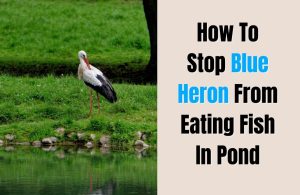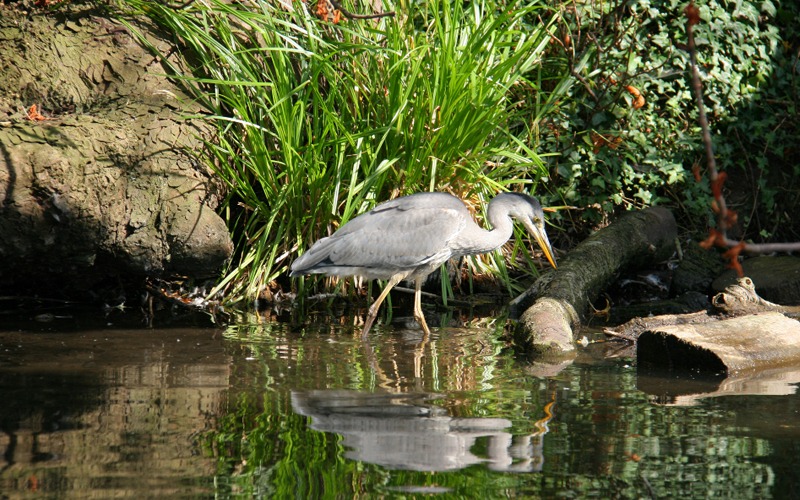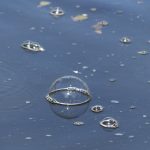If you are a fish farmer then you may also face problems with blue herons. Because blue herons eat fish throughout the year, especially in summer. But if you don’t know how to keep blue heron from eating pond fish, don’t worry.
To protect your pond fish from blue herons, create hiding spots with plants and rocks, making it harder for herons to spot and catch them. Install netting over the pond as an additional barrier. Place decoys or reflective objects around the pond to deter herons.
Use motion-activated devices or scarecrows to startle them away. Change the pond layout regularly to disrupt their hunting patterns.
Additionally, consider a heron decoy or silhouette to intimidate them. By combining these methods, you can make your pond less attractive to blue herons and safeguard your fish.
How To Stop Blue Heron From Eating Fish In Pond

Here we are going to tell you several different ways how you can keep heron away from the pond. Protecting your pond from blue herons and ensuring the safety of your fish involves a combination of practical strategies and thoughtful planning.
Implementing these measures can help create a pond environment that is less appealing to herons, minimizing the risk of fish predation.
Natural Hiding Spots:
Introducing aquatic plants, such as water lilies, and strategically placing rocks and other structures in your pond provides shelter for fish.
This makes it harder for herons to see and catch them. Ensure there are enough hiding spots throughout the pond to create a secure environment.
Floating Vegetation:
In addition to aesthetic appeal, floating vegetation like water lilies serves as a protective cover for fish. The leaves create a barrier on the water’s surface, making it challenging for herons to spot and catch fish underneath.
Netting:
Install a fine mesh pond net over the water to physically prevent herons from accessing your fish. Make sure the net is tightly secured to prevent herons from lifting or pushing it aside.
Netting is one of the best ways how you can keep birds away from your pond. Not even, herons and cranes, you can protect your pond fish from all types of birds.
Decoys And Reflective Objects:
Heron decoys can mimic the presence of another heron, exploiting their territorial nature. Reflective objects, like wind chimes or shiny surfaces, can create visual disturbances, making herons uncomfortable and less likely to approach.
Motion-Activated Devices:
Motion-activated devices, such as sprinklers or lights, startle herons when they approach. Over time, herons associate the pond with unexpected disruptions, deterring them from attempting to catch fish.
Scarecrows:
Water-based scarecrows move with the wind, creating a dynamic and unpredictable presence. This discourages herons from approaching as they perceive the area as unpredictable and potentially dangerous.
Changing Pond Layout:
Regularly rearrange rocks, plants, and other features in your pond. This disrupts herons’ familiar hunting patterns, making it more difficult for them to locate and catch fish.
Heron Silhouettes:
Installing cutout silhouettes of herons near the pond can trick other herons into thinking the territory is already claimed. This territorial behavior may discourage additional herons from approaching.
This technique can keep herons and cranes away from your pond. So hope you also understand how to keep cranes away from the pond.
Raised Pond Edges:
Design the edges of your pond with raised areas or steep slopes. Herons prefer shallow water for wading, and raised edges act as a natural deterrent, making it less convenient for them to access the water.
Protective Fencing:
Erecting a physical fence around the pond provides a direct barrier against herons. Choose a material that herons cannot easily penetrate, and ensure the fence is tall enough to prevent them from flying over.
Supplementary Fish Food:
Well-fed fish are generally more agile and alert. Ensure your fish are receiving high-quality supplementary food, making them faster and better equipped to evade heron attacks.
Use Fish Shelters:
Fish shelters or breeding tubes placed in the pond provide additional hiding spaces. These structures offer refuge for fish, making it more challenging for herons to locate and capture them.
By combining these strategies, you create a multi-layered defense system that addresses various aspects of heron behavior and predation.
Regular observation and adjustments to your chosen methods can help maintain an effective deterrent against herons and protect your pond fish.
How Do I Keep Blue Herons From Eating My Pond Fish
So here we are going to talk about how to stop herons from eating my pond fish. Well, to stop blue herons from eating your pond fish, do a few things. First, add plants, rocks, and things in your pond so fish can hide.
Put a net over your pond to keep herons away. You can also use fake herons, shiny things, and moving gadgets like sprinklers to scare them. Change your pond sometimes, moving things around, so herons don’t know where to find fish.
Put fake herons or shapes that look like herons around your pond. Make the edges of your pond higher or steep so herons can’t easily get to the water. If you can, build a fence around your pond to keep herons out.
Feed your fish good food so they can be quick and smart, making it harder for herons to catch them. Also, use shelters or tubes in your pond for fish to hide.
By doing these things, you make it tricky for herons to find and catch your fish, keeping them safe in your pond.
Frequently Asked Questions
Q: How can I create natural hiding spots for my pond fish to protect them from blue herons?
A: Make safe spots in your pond for fish from herons. Put rocks, plants, and floating things in the water. This gives fish hiding spots, so herons can’t easily see or catch them, keeping the fish safe.
Q: What types of plants and structures are effective in making hiding spots for fish in the pond?
A: Use tall aquatic plants like water lilies, and add submerged rocks, logs, or artificial structures. These create hiding spots in the pond for fish, offering protection from predators like blue herons and ensuring their safety.
Q: Is using a pond net an efficient way to prevent blue herons from catching fish?
A: Yes, using a pond net is an effective method to prevent blue herons from catching fish. The net acts as a physical barrier, denying herons access to the water and safeguarding the pond’s fish. Regular monitoring and maintenance ensure the net remains a reliable deterrent against avian predators.
Q: What are the benefits of introducing floating vegetation like water lilies to deter herons?
A: Floating vegetation like water lilies offers pond fish a natural refuge from herons. It provides hiding spots, obstructing the heron’s view and making it harder for them to catch fish. Additionally, it enhances the pond’s ecosystem and aesthetics.
Q: Can decoys and reflective objects really discourage blue herons from approaching the pond?
A: Decoys and reflective objects may deter blue herons by creating the illusion of danger or confusing them. While not foolproof, these methods can be effective in discouraging herons from approaching the pond and reducing the risk of fish predation.
Q: How often should I change the layout of my pond to disrupt herons’ hunting patterns?
A: Changing the pond layout periodically, ideally every few weeks, can disrupt herons’ hunting patterns and make it harder for them to locate fish.
Altering the arrangement of rocks, plants, and floating objects prevents herons from memorizing the environment, reducing the likelihood of successful predation and providing better protection for pond fish.
Q: Are motion-activated devices, such as sprinklers or lights, effective in deterring herons?
A: Yes, motion-activated devices like sprinklers or lights can be effective in deterring herons. The sudden movement or illumination startles herons, making them wary and less likely to approach the pond, reducing the risk of fish predation.
Final Words
Today here we have told you how to keep blue heron from eating pond fish. We have told you how you have to develop natural hiding spots with rocks, aquatic plants, and floating vegetation, providing sanctuary for the fish.
Employ physical barriers like pond nets, which hinder heron access. Enhance deterrence with decoys, reflective objects, or motion-activated devices, disrupting herons’ hunting patterns.
Now you can easily rotate the pond layout periodically to prevent herons from memorizing it. Consider incorporating sprinklers or lights triggered by motion for added effectiveness. Hope this article will be helpful for you.





